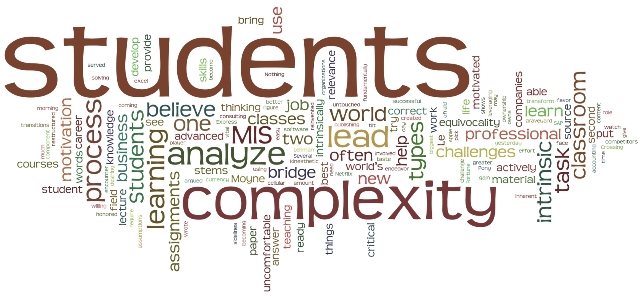J. Christopher Zimmer Ph.D.

Teaching Philosophy
I teach technologically advanced courses that require advanced critical thinking and problem solving skills in order to succeed. I assume that students are intrinsically motivated to excel in my courses and are willing to put the time in to master the material. I believe that learning is sometimes an uncomfortable process that often challenges beliefs and assumptions. In the end, by showing persistence and allowing the process to work, students are transformed and are primed to enter the professional world, ready and able to face the challenges of adult life. When a student is not intrinsically motivated, it is my job to motivate them. I accomplish this by using assignments similar to what they would see in a real business environment.
I believe that it is my job to build the bridge that transitions students from their pre-college life to one where they are ready to take their role in the professional world. Students often enroll in MIS classes because they are required. It is my job to bring out the relevance of the subject material. These students will work in one of two types of industries: (1) one that is being fundamentally restructured by the Internet and information technology or (2) one that has already been. Nothing remains untouched. Apple is the world’s biggest player in the music business; Netflix has become Hollywood’s new power broker, Amazon is the new Wal-Mart, and UPS owns of the world’s largest cellular network. The MIS field has reinvented currency, changed how wars are fought and people are tracked. It has created billion-dollar companies. Currently we’re in the midst of IT-fueled transformation of banking, insurance, finance, accounting, healthcare, publishing, consulting, and education. For better or worse, two types of managers dominate business: (1) those who can intelligently participate, lead, and transform their organizations to exploit IT to tilt the landscape in their favor and (2) those who will watch from the sidelines as competitors that appeared yesterday put their company in the corporate graveyard with the likes of Pony Express, TWA, Blockbuster, Nortel, Napster, Global Crossing, and Lehman Brothers.
Very few students arrive at the door desiring to pursue MIS as a career. I am fortunate that MIS is an applied field as I am a kinesthetic learner. I learn by doing and not being afraid to try new things. It is easy to bring that to the classroom, and I liberally use hands on assignments to gauge student learning. Many students pick up MIS as a second major because the do see its relevance to their eventual career goals. Since coming to Le Moyne, I have increased the “learn by doing” component of my classes by leveraging SAP to challenge students both professionally and academically. Students gain confidence by actually working with the same software that Fortune 500 companies use every day.
I believe that when students are crossing the bridge, they are best served when they are actively challenged in the pursuit of knowledge. A teacher may be inspiring during lecture, but students should be actively engaged in the learning process for it to be successful. In an effort to give students greater ownership of the knowledge they encounter in class, I use cooperative learning strategies in addition to lecture in the classroom. I try to develop assignments for students that foster both analytical and critical thinking.
Campbell (1988) wrote a paper on objective task complexity that deeply impacted my approach to teaching content both in and out of the classroom. In this paper, it is argued that task complexity has two fundamental sources. The first source of complexity stems from the amount of things or steps involved in completing the task. The second source of complexity stems from the inherent equivocality of the task. It is the latter form of complexity, the equivocality, which makes students uncomfortable. Equivocal types of tasks often have multiple correct answers or there is no correct answer, only a best answer. I believe it is my duty to help students develop the skills they need to be able to address these types of problems.

The figure above shows a word cloud of my teaching philosophy. Several words leap out in that figure. Students, learning, complexity, process, these words are vital to me. Students are why I wake up in the morning. I am honored to be entrusted to help them cross the bridge into the professional world. In my classes, I endeavor to provide students with a taste of the rich complexity the world has to offer. I have high expectations for my students, and I do my utmost to help them to learn as much as they can during the process. Le Moyne students are wonderful; they are polite, diligent, and respectful and those characteristics coupled with the challenges I provide for students in the classroom lead them to becoming well-rounded contributing members of society.